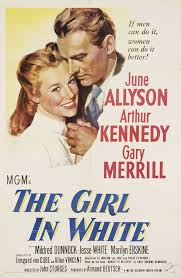
THE GIRL IN WHITE
US, 1952, 92 minutes, Black and white.
June Allyson, Arthur Kennedy, Gary Merrill, Mildred Dunnock, Jesse White, Marilyn Erskine, James Arness.
Directed by John Sturges.
The Girl in White is a pleasing biography of Dr Emily Dunning, the first woman doctor to be employed by a New York hospital. It is based on the book that she wrote with her husband, Dr Ben Barringer.
June Allyson was very popular at this time, especially in musicals, but developing in more serious roles like this one. 34 at the time of the making of the film, she could still pass as a teenager when necessary. She is supported very well by Mildred Dunnock as Dr Marie Yeomans, a qualified doctor who could not be employed by any New York hospital, even though she had written some important medical books. Arthur Kennedy is the fellow student who, despite his prejudices, relents and eventually marries Emily Dunning. Gary Merrill is the medical supervisor of the hospital, initially opposed to Emily but appreciating her qualities and her interactions with her patients. There is a pleasant cameo by James Arness some years before Gunsmoke.
In many ways the film is routine in its presentation of its subject, the plight of women, the role of medicine in hospitals. But, it is very sympathetic and it is extraordinary to think back about the prejudices against women – and this film, of 1952, is looking back only half a century.
At the time, the film’s director, John Sturges, was making serious dramas at MGM, including Right Cross with June Allyson, but was soon to move to bigger films from Bad Day at Black Rock to The Gunfight at the OK Corral, The Magnificent Seven and The Great Escape.
1. A pleasing historical biography of the 1950s? Only half a century after the events?
2. New York settings, the turn of the 19th century, apartments, hospitals, wards, accommodation, Cornell University, the ambulance on the streets? The musical score?
3. The film based on actual events and characters, the autobiography of Emily Dunning?
4. The opening, the Dunning family moving, the dead father, the pregnant mother, the removalers, her collapse, the search for a doctor, finding Dr Yeomans, her initial hesitation, helping with the birth of the child, Emily doing well, commended by Dr Yeomans?
5. The aftermath, the influence of Dr Yeomans, as a doctor for decades in New York City, writing books but not indicating that she was a woman, not being able to get a job in a New York hospital? The prejudice, men thinking medicine was a man’s world, not imagining women doctors?
6. Emily, her determination, discussions with Dr Yeomans, getting her help, going to Cornell University, studies, Ben and his limerick and flirtation, the resistance? Her serious-mindedness? The male students mocking her? Her graduation? Her not being accepted into any New York hospital? Going to see Dr Pawling, his prejudices against her, dismissal?
7. The support of Dr Yeomans, her going to the medical supervisor, the threat of the media and its response? Emily being sent to the hospital, Dr Pawling having to accept her?
8. Her arrival, the reaction of the nurses, been shown to her quarters, the shared bathroom, her later getting the bath (and its overflowing)? In the dining area, Dr Graham and his insults, the suffragette movement, her clothes unsuitable for ambulance work, cutting the petticoat, changing issues, making her uniform?
9. Ben, his attraction to Emily, at the dance, the proposal, his not believing women should be doctors, only one doctor in the family, Emily’s rejection? His later being at the hospital, interest in research? Support of her? Encouragement? Yet his not fully believing in women doctors? Their work together, his gradual mellowing, the going out to the beach, their love, but Emily devoted to her work? The social for Dr Pawling, her concern about him, dancing with him, Ben’s reaction? His getting the scholarship, the radium, showing it to her, Mme Curie, his hesitations, the farewell, talking with Dr Yeomans, talking with Emily, the kiss – and the return and the later marriage?
10. Dr Pawling, severe, his wife divorcing him, his attitude towards Emily? The operation on the boy? His gradual change? The social and his dancing with her? The typhoid outbreak? Is changing the recreation room into a ward? Hiring Dr Yeomans, discovering she was a woman? His support of Emily? His saying that she had the personal quality which was important to put patients at ease?
11. Emily, work, going on the ambulance runs, Alec and his friendship, giving advice as to how to get on the ambulance? The first case, the very tall man, his dislocated shoulder and her fixing it, his appreciation?
12. Dr Graham and his pronouncing the man dead, Emily not so sure, joining with the nurses, reviving him, the press and the photos, Dr Pawling’s reaction?
13. Dr Graham, penalising Emily, putting her on more ambulance duty?
14. The aftermath of the episode of providing the man, Dr Pawling reprimanding Dr Graham?
15. The typhoid outbreak, Dr Yeomans coming, sharing the room with Emily, the discussions, especially about love, Dr Yeomans and her heart condition, her collapse, quiet death?
16. A portrait of medicine in New York City, the role of women doctors, Emily Dunning and her pioneering work, Marie Yeomans? Looking back on the male prejudice against women and their treatment of the women in the hospitals?